You want to generate more organic leads but you don’t know how to track your real estate SEO performance. That’s common.
You want to pull more traffic to your website (with less money) and you want to convert that traffic into cash for your real estate agent or investing business.
That’s good — you’ve chosen the right strategy: SEO. Since people who find your website all on their own are usually more motivated than those who see your ad on Facebook, SEO doesn’t just drive traffic but works to improve the conversion rate of your website. And with high-quality traffic and leads comes less time spent dealing with tire-kickers who’ll never convert, regardless of how hard you try.
In other words, SEO benefits your business in a multitude of ways. Less time spent on the wrong leads, more time spent on the right leads, more website traffic, higher conversion rate, consistent lead generation, and even financial predictability.
But there’s a problem…
How do you know if your SEO strategy is working? How do you know that you’re SEO performance heading in the right direction?
After all, SEO can take months or years to start having a tangible impact on your business, so how do you know you’re not just wasting your time?
Here are 4 mission-critical SEO metrics to keep an eye on while you’re climbing your way through the rankings.
4 Mission-Critical Real Estate SEO Performance Metrics You Need to Be Using
1. Rankings
This metric might be obvious to you…
If you’re going to drive passive traffic to your website and you’re going to convert more leads without running more paid ads, you must get to the first page of Google.
But that can take months, years even. How do you know you’re making progress?
The simplest way to check is to open an incognito web browser window and type in the search phrase that you’re trying to rank for. Then click through Google’s results and see if you can find your website.
Problem is, that’s time-consuming, especially once you’re trying to rank for 10 or 20 different keyword phrases. At that point, you don’t want to manually check all those rankings.
This is why, at Carrot, we created our Keyword Ranking Tracker tool for our Content Pro and Advanced Marketer members.
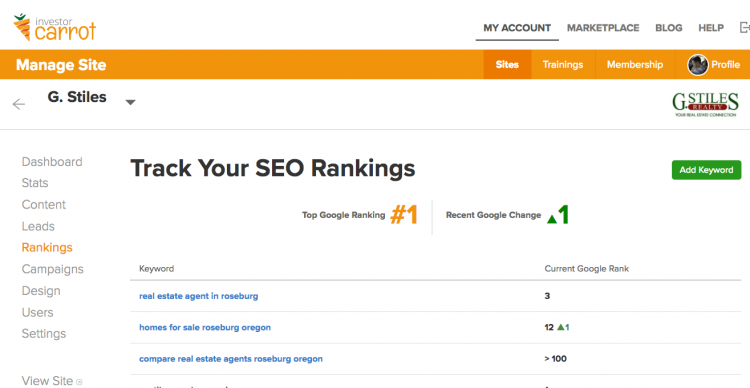
This tool tracks your rankings for specific keyword phrases in near real time. You can use it to quickly determine where your website is at for multiple keyword phrases you’re targeting. Every page in Google typically has 10 results, so 1-10 means you’re on the first page, 11-20 is second page, and so on.
2. Domain Authority
Another way to determine whether you’re making progress in the eyes of Google is to check your website’s domain authority.
What is domain authority?
It might sound complicated, but it’s actually pretty simple when you get down to it. Domain authority is the overall authority that search engines (Google, mostly) attributes to your domain. More authority is better and means that your website has a higher chance of ranking in results. Conversely, a low authority means that Google is unsure of whether you’re trustworthy or not (yet) and it’ll be more difficult for your website to get on the first page of Google’s results.
But the more content you create, the more opportunities you’ll have to rank in search engines (each page or blog post has a chance to rank). This is why we include monthly expert-written content as a part of our (Carrot’s) Content Pro and Advanced Marketer Plans.
Plus, the longer your website exists…
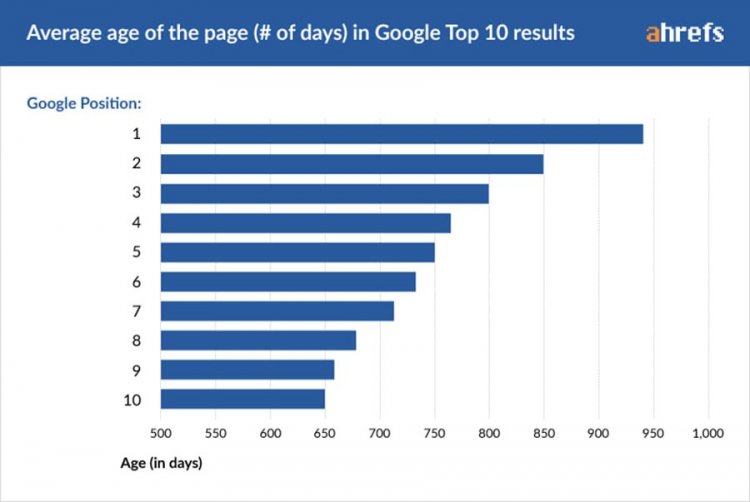
…and the more backlinks you get…
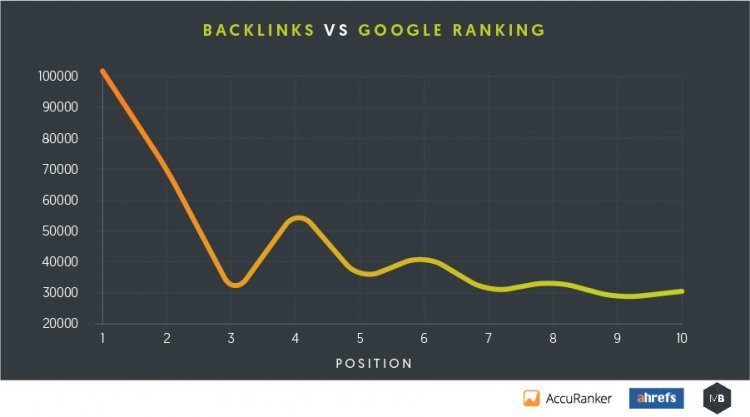
…the higher your domain authority will climb.
Domain authority is measured on a scale from 1-100 (1 is low, 100 is high) and the higher your score, the easier it is to get rankings.
You can check your domain authority over here — just type in your domain and click “Check Authority.”
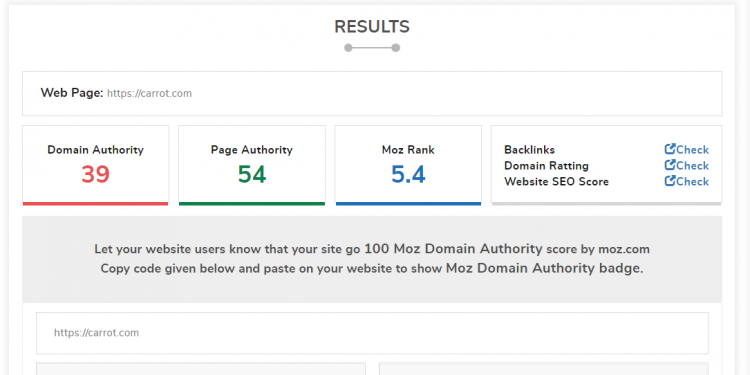
3. Traffic
Not all rankings are equal.
You might, for instance, get your website ranking for “real estate investors who run 6 miles per day”, but that ranking doesn’t do you any good if people aren’t already typing that phrase into Google — and not just anything, the right people.
The reason that it’s so important to do keyword research before you start executing an SEO strategy is that you want to make sure that the phrase(s) you’re targeting isn’t a total waste of time.
You can use Ubersuggest to check the search volume for any given keyword phrase.
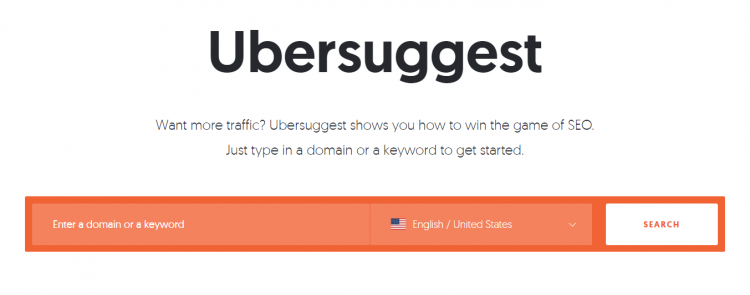
Just type the phrases you’re thinking of trying to rank for into the search bar and click “Search”. This will provide you with some information about how that keyword phrase performs in Google and with other keyword phrase ideas.
But, back to website traffic.
When you start ranking for your target keyword phrase(s), that’s when the rubber meets the road. Check your analytical information to see where your website traffic is coming from and if you’re actually getting more traffic from search engines.
You can use Google Analytics (here’s how to set it up on your website) or you can look at your Carrot “Stats” dashboard if you’re a Carrot member.
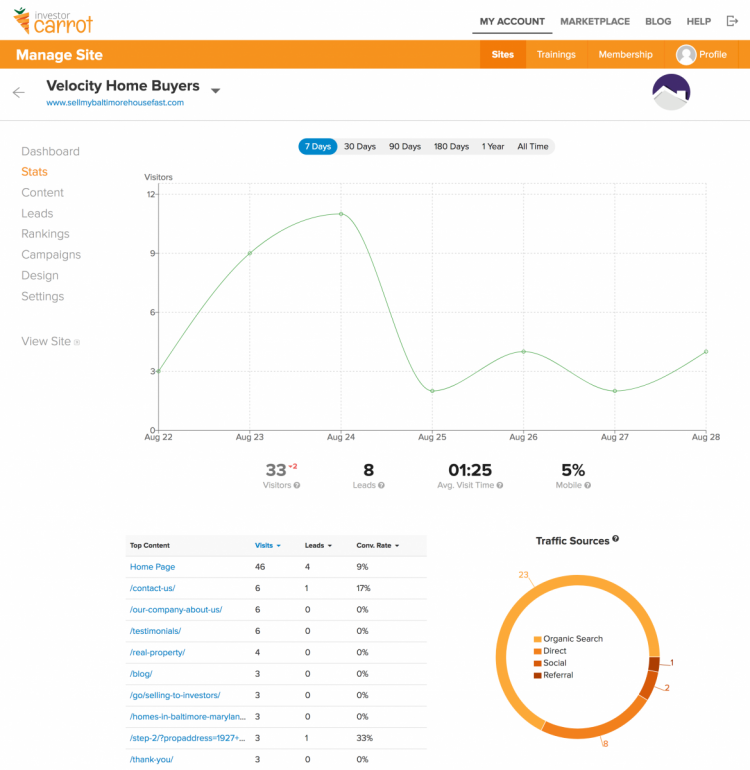
Look at the “Traffic Sources” in the bottom right hand corner to determine where you’re website traffic is coming from and if you’re SEO efforts are paying off.
If they aren’t and you’re already on the first page for multiple keyword phrases, then you might want to target a keyword phrase with higher search volume.
4. Conversion Rate
Imagine that you’re ranking on the first page of Google for several different keyword phrases. Let’s even imagine that those keyword phrases are driving passive traffic to your website every month — maybe a few hundred visits.
When analyzing your SEO strategy, there’s only one more step in the funnel to make sure everything is working as it should: is that search engine traffic converting on your website?
Because it doesn’t matter at all how much website traffic you get if none of that traffic is turning into leads or, when you call them, they have no interest in your services.
So keep a close eye at how that SEO-based increase in traffic is affecting your overall business — are you getting more leads? Are you doing more deals?
You should be.
And if you’re not, then either something is wrong with your website (maybe it’s not building enough credibility or it loads too slowly — Carrot website’s are proven to be high-converting out of the gate) or something is wrong with the traffic you’re driving (they aren’t people with the right intention.
If you’re a real estate investor in Idaho, you might be able to get your website ranking for “The best mountain biking trails in Idaho”, but that website traffic isn’t going to do your business a whole lot of good. Something like “Sell my house fast in Idaho” would be far better.
Adapting Your SEO Strategy To Dominate Your Market…
In the SEO series we’ve been working on over the last few months, we’ve laid out lots of different strategies to help you get ranking in Google.
But here’s the thing: each market is different and different strategies will work better (or worse) in different markets. Some markets are more competitive and difficult to rank in while other markets will only require a few months of effort to see results.
In the end, you need to do whatever is best for your business.
Here are a few final thoughts that might change the way you approach SEO in your market:
- Competitive Market — If you’re in a highly competitive market with lots of other investors or agents gunning for the same keywords that you’re trying to rank for, then you might be better off aiming for long-tail keywords to start. These are just long keyword phrases that tend to have a lot less competition (and are thus easier to rank for). Consider, for example, “Sell my house fast for cash easily in [location]” versus “Sell my house in [location].”
- Uncompetitive Market — In an uncompetitive market, you might find that you can target more basic keyword phrases with higher search volume and still see results within a few months. In that case, take advantage of the market you’re in and create new content to rank for each phrase your possibly can.
- Paid Ads VS. SEO — While we’ve talked a lot about SEO over the last few months, let’s not forget that paid advertising should be a critical part of your overall marketing game plan — especially when you’re just starting out. SEO will provide you with long-term success and financial predictability, but paid advertising works quicker and can get you leads by the end of next week. So use both as you need to to build a thriving business.
Conclusion
SEO has lots of benefits to offer your business if you put in the work to make your website rank.
It’ll take time… but stick with it and you’ll pull it off.
On your journey, you can use the above tips to track your progress and adjust your strategy based on your market.
And let us know if you have any questions along the way — we’d love to help however we can. :-)

